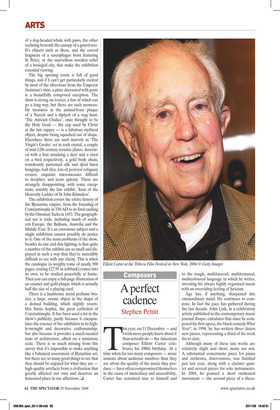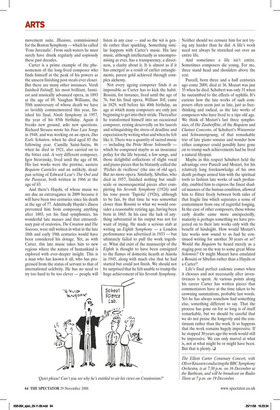A perfect cadence
Stephen Pettitt
This year, on 11 December — and I wish more people knew about it than actually do — the American composer Elliott Carter celebrates his 100th birthday. At a time when far too many composers — more anxious about audience numbers than they are about the quality of the music they produce — have often compromised themselves in the cause of immediacy and accessibility, Carter has remained true to himself and to the tough, multilayered, multitextured, multicoloured language in which he writes, investing his always highly organised music with an overriding feeling of lyricism.
Age has, if anything, sharpened this extraordinary mind. He continues to compose. In fact the pace has gathered during the last decade. John Link, in a celebratory article published in the contemporary music journal Tempo, calculates that since he composed his first opera, the black comedy What Next?, in 1998, he has written three dozen new pieces, representing a third of his work list to date.
Although many of these late works are relatively slight and short, many are not. A substantial concertante piece for piano and orchestra, Interventions, was finished just last year, along with a clarinet quintet and several pieces for solo instruments. In 2004, he penned a short orchestral movement — the second piece of a three movement suite, Illusions, commissioned for the Boston Symphony — which he called ‘Fons Juvenalis’. From such waters he must surely have drunk regularly and copiously these past decades.
Carter is a prime example of the phenomenon of the long-lived composer who finds himself at the peak of his powers as the unseen finishing post steals ever closer. But there are many other instances. Verdi finished Falstaff, his most brilliant, funniest and musically advanced opera, in 1893 at the age of 89. Vaughan Williams, the 50th anniversary of whose death we have so lavishly commemorated this year, finished his final, Ninth Symphony in 1957, the year of his 85th birthday. Again it breaks new ground, asks new questions. Richard Strauss wrote his Four Last Songs in 1948, and was working on an opera, Das Esels Schatten, when he died aged 85 the following year. Camille Saint-Saëns, 86 when he died in 1921, also carried on to the bitter end. A very different composer, Igor Stravinsky, lived until the age of 88. His last works were the pristine, austere Requiem Canticles and an unlikely, deadpan setting of Edward Lear’s The Owl and the Pussycat, both written in 1966 at the age of 83.
And there’s Haydn, of whose music we are due an extravagance in 2009 because it will have been two centuries since his death at the age of 77. Admittedly Haydn’s illness prevented him from composing anything after 1803, yet his final symphonies, his wonderful late masses and that extraordinary pair of oratorios, The Creation and The Seasons, were still written in what in the late 18th and early 19th centuries would have been considered his dotage. Yet, as with Carter, this late music takes him to new regions where the nature of humankind is explored with ever-deeper insight. This is a man who has known it all, who has progressed from the status of servant to that of international celebrity. He has no need to try too hard to be too clever — people will listen in any case — and so the wit is gentle rather than sparkling. Something similar happens with Carter’s music. His late music, although intellectually as uncompromising as ever, has a transparency, a directness, a clarity about it. It is almost as if it has emerged as a result of earlier entanglements, purest gold achieved through complex alchemy.
Not every ageing composer finds it as impossible as Carter has to kick the habit. Rossini, for instance, lived until the age of 76, but his final opera, William Tell, came in 1829, well before his 40th birthday, an age at which many composers are only just beginning to get into their stride. Thereafter he transformed himself into an occasional composer, resting deservedly on his laurels and relinquishing the stress of deadline and expectation by writing what and when he felt like it. There was a quantity of sacred music — including the Petite Messe Solennelle — which he composed maybe as an insurance policy for the life beyond, a few songs, and those delightful collections of slight vocal and piano pieces that he blatantly called the ‘Péchés de vieillesse’ (the sins of old age). But no more opera. Similarly, Sibelius, who died in 1957, finished nothing but smallscale or inconsequential pieces after completing his Seventh Symphony (1924) and his tone poem ‘Tapiola’ (1926), although to be fair, by that time he was somewhat closer than Rossini to what we would consider a reasonable retiring age, having been born in 1865. In his case the lack of anything substantial in his output was not for want of trying. He made a serious stab at writing an Eighth Symphony — a London performance was advertised in 1933 — but ultimately failed to pull the work together. What did exist of the manuscript of the Eighth is thought to have been consigned to the flames of domestic hearth at Ainola in 1945, along with much else that he had started but could not finish. We should not be surprised that he felt unable to trump the huge achievement of his Seventh Symphony. Neither should we censure him for not trying any harder than he did. A life’s work need not always be stretched out over an entire life.
And sometimes a life isn’t entire. Sometimes composers die young. For me, three stand head and shoulders above the rest.
Purcell, born three and a half centuries ago come 2009, died at 36. Mozart was just 35 when he died. Schubert was only 31 when he succumbed to the effects of syphilis. It’s curious how the late works of such composers often seem just as late, just as freethinking and radical, as the late works of composers who have lived to a ripe old age. We think of Mozart’s last three symphonies, of Die Zauberflöte, of the Requiem and Clarinet Concerto, of Schubert’s Winterreise and Schwanengesang, of that remarkable trio of late piano sonatas and wonder how either composer could possibly have gone on to trump such achievements had he lived a natural lifespan.
Maybe in this respect Schubert held the advantage over Purcell and Mozart, for his relatively long foreknowledge of his own death perhaps armed him with the spiritual tools to fashion late works of such profundity, enabled him to express the finest shaded nuances of the human condition, allowed him to flitter freely between both sides of that fragile line which separates a sense of contentment from one of regretful longing. In the case of other composers, those whose early deaths came more unexpectedly, maturity is perhaps something we have projected on to their late works only with the benefit of hindsight. How would Mozart’s late works now sound to us had he continued writing for another 30 years or so? Would the Requiem be heard merely as a staging post on the way to some great Missa Solemnis? Or might Mozart have emulated a Rossini or Sibelius rather than a Haydn or a Carter?
Life’s final perfect cadence comes when it chooses and not necessarily after inventiveness is spent. At various points along his career Carter has written pieces that commentators have at the time taken to be crowning summations, probable last words. Yet he has always somehow had something else, something different to say. That the process has gone on for so long is of itself remarkable, but we should be careful that we do not praise the longevity and the continuum rather than the work. It so happens that the work remains hugely impressive. If he stopped 30 years ago the work would still be impressive. We can only marvel at what is, not at what might be or might have been. But that is plenty. ❑ The Elliott Carter Centenary Concert, with Oliver Knussen conducting the BBC Symphony Orchestra, is at 7.30 p.m. on 16 December at the Barbican, and will be broadcast on Radio Three at 7 p.m. on 19 December.



































































































 Previous page
Previous page